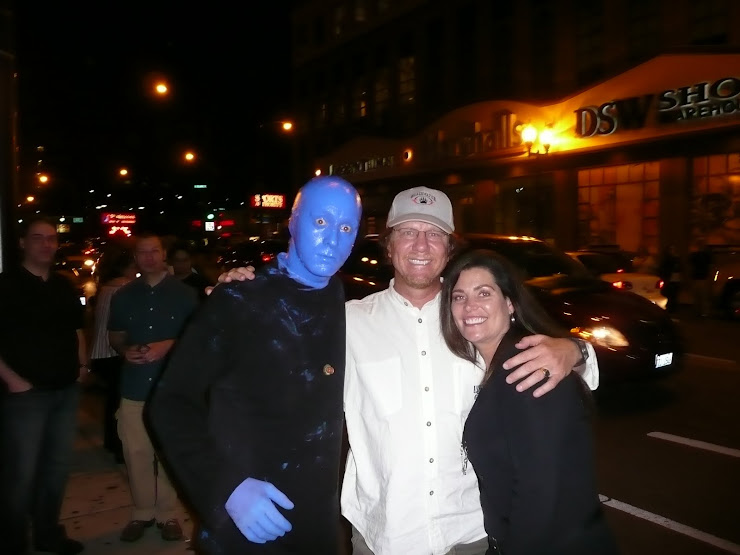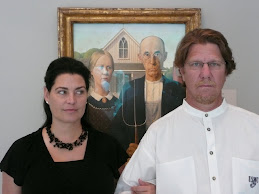Today, I read that Hunter S. Thompson killed himself.
In case you are unaware, Hunter S. Thompson was a wildly-successful writer and journalist, who first became famous through his writings for The Rolling Stone, in which he used a writing style he dubbed “gonzo journalism.” In essence, he made himself (as the writer) a key part of the story, which then gave him license to report a story that was part fact, part fiction, and part madness. The madness-factor came largely from Thompson’s voracious appetite for drugs and alcohol, which played a key role in all of his stories and books.
Thompson’s suicide got me thinking, because his death was a bit different than the usual movie and rock star overdose/suicide/car crash. Most rich and famous people (who die from excess) die hiding their lifestyle from public view-- they harbor a guilt or shame about their addictions, and most of us are (at least) mildly surprised when we read that yet another person “with everything” is dead.
But Hunter S. Thompson was different: He was famous for his drug and alcohol appetite, and it was who he was. His abuse of drugs and alcohol was legendary, and his ability to function while stoned was discussed in practically every article written about him. Thompson was hiding nothing, and he was rewarded with money and fame for doing so.
For many addicts and alcoholics, Thompson had beaten the system: He could do anything he wanted, completely devoid of judgment by his fellow man. He could medicate any unpleasant feelings or concerns he had, pass out face down on the Main Street of Aspen, and have people fighting over who got to take him home. By secular standards, Hunter S. Thompson had it all, and then some: Money, fame, talent, and an unheard of “get out of morality” free card.
And in the end, he killed himself.
Why? Hunter S. Thompson had utter secular freedom. Bill Gates only dreams of a life where he gets to say, “Yeah, we’re a monopoly. Too bad.” Michael Jackson only dreams of a world where he gets to say, “It’s my private life. Leave me alone.” And Hugh Hefner only dreams of a world where he gets to say, “We’re dumping all those articles no one reads, and just running pictures of naked women.”
Think of it: For Hunter S. Thompson, there were no boundaries, except his personal pursuit of happiness. So why the gunshot to the head?
I think I know.
I think it’s because we’re hardwired to worship God. It’s in our DNA, down deep in the stuff that makes us humans. And because of this, we can never actually be happy, or fulfilled, or at peace unless we’re acting on this calling. You can’t be happy if you don’t breathe, can you? It’s tough to be fulfilled if you stop drinking liquids, isn’t it? And so it is with our instinct to worship: God made us in His image, for His own pleasure, and part of the glue He used was a need to worship Him.
There’s a catch, however— we can choose to worship something other than God. And we all do. It certainly seems that Hunter S. Thompson took to worshipping drugs and alcohol and the no-boundaries lifestyle, but he’s no different than you and I.
What is it that you worship? Money? Power? Work? Yourself? Status? Pleasure? Academics? Fitness? Sex? A Hobby? Philosophy? Recognition from others?
I believe the hard cold fact is this: There aren’t many folks who, given a demand that they choose only one thing to do with their free time for the rest of their life would say, “Sign me for Worshipping God.” But, the reality is that these folks would be the only ones who would achieve happiness and contentment. The rest of us would end up, well, like Hunter S. Thompson, unable to understand why happiness eludes us even though we’re doing what we want to do.
As a Christian, what I’ve come to understand and believe is this: Without God and His Son Jesus in your life putting the world in perspective, you’re got very little chance of achieving real peace, contentment, and happiness. One need only look at the lives of movie stars and rock stars to see fame doesn’t bring it.
Doing in-depth research on the lives of Lotto winners and business moguls will provide pretty solid evidence that money doesn’t do it. Hunter S. Thompson has given a pretty good testimony that moral freedom doesn’t do it.
I believe, bottom line, that the New Testament is accurate, and that Jesus was telling the Truth when He said, “I am the bread of life.” And I believe it is because of Jesus that Christians in the Third World living in abject poverty can achieve happiness and contentment, while agnostic Americans live their lives miserably in the lap of luxury.
If I was an atheist, my objection to the argument I’ve presented would be this: Why would a loving God hardwire us in such a way? Why would He make achieving human happiness contingent on our relationship with Him and His Son Jesus? And I’d answer “it is because He wants what’s best for us.” And then I’d respond to that question with these comments: Even though you’re an atheist, you obviously want the best life possible for your kids, right?
As a result, you attempt to “hardwire” your kids (through rules and encouragement) to be creative, thoughtful, and smart in their decisions. You also encourage them to maintain an open, positive relationship with you… to seek your advice… and to obey the parameters you’ve set for behavior. Why? Because you want your kids to have a fulfilling, happy life while avoiding as much unnecessary pain as possible. And in my opinion, you are fully qualified to do this because you are wiser than your kids. Hmmm, to me it sounds a lot like God’s relationship with us.
In my opinion, modern history offers no better example of “unrestrained secular freedom” than Hunter S. Thompson. He had talent, money, and fame. He lived in a beautiful area, where his neighbors not only put up with his life of excess—they applauded it, and encouraged it. He did exactly what he wanted, when he wanted, how he wanted. He was, in a way, even above the law, as any other well-known drug abuser would have long since been thrown in jail. He could do virtually anything, and his fans in Aspen would say simply, “Oh, that’s Hunter. He’s our town nut, but we love him.”
He had total, secular freedom. And yet, he killed himself.
Shouldn’t this tell us something?
Friday, February 19, 2010
Subscribe to:
Post Comments (Atom)



No comments:
Post a Comment